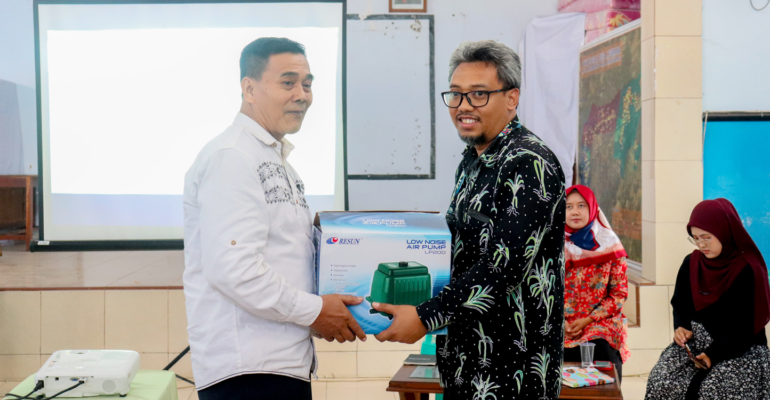Lecturer’s Homecoming in Lesmana Village: IPB University Lecturer Reveals Potential of Maggots as Alternative Floating Fish Feed

The Directorate of Agro-Maritime Community Development (DPMA) of IPB University organized a community service activity for lecturers to apply research findings to the community, providing solutions to societal problems.
The Dosen Pulang Kampung (Dospulkam) activity, lead by Dr Dimas Andrianto, carried the theme ‘Development of Floating Fish Feed from Maggots and Tofu Waste’ on (15/7) at the Lesmana Village Hall, Ajibarang District, Banyumas Regency, Central Java.
This event aimed to socialize the potential use of maggots and tofu waste as floating fish feed through material presentations by IPB University lecturers, namely Dr Dimas Andrianto and Amalia Putri Firdausi SPi, MSi.
The activity was attended by Aris Nurhayati (Chief of Lesmana Village), Arif Ependi, AP, MSi (Ajibarang Sub-district Chief), and Suratmo (Chief of Fish Farming Group/Pokdakan Ulam Sari). Participants who attended this activity were predominantly members of the Lesmana Village Pokdakan.
The event also involved students from the IPB Innovation Real-Thematic Work Lecture (KKNT) and the community in enhancing freshwater fish production in Lesmana Village.
Amalia Putri Firdausi, SPi, MSi, an IPB University expert in Fish Farming Technology and Management, presented material on freshwater fish farming techniques. Additionally, she explained the methods of fish breeding and the physical characteristics distinguishing male and female fish.
In her presentation, Amalia stated that Lesmana Village is more suitable for freshwater fish farming due to its geographic location far from the sea.
The second speaker, Dr Dimas Andrianto, an IPB University Biochemistry expert, presented on the potential of maggots and tofu waste as floating fish feed. He explained the general definition of maggots and their breeding process using organic waste to be turned into floating fish feed.
Dr Dimas’s presentation was accompanied by a video on the production of floating fish feed located in Karanggede, Boyolali, Central Java. “The formulation for producing floating fish feed from maggots and tofu waste is still under further research, but maggots have the potential to become an alternative floating fish feed and provide a solution for recycling organic waste,” he explained.
On this occasion, the Dospulkam program provided an aerator grant to the Chief of Pokdakan Ulam Sari, Suratmo, to assist in the operational breeding of catfish.
The Lesmana Village authorities appreciated the presence of the IPB University Dospulkam team and thanked them for sharing knowledge to advance freshwater fish farming in Lesmana Village. (ZRA/Rz) (IAAS/RUM)



